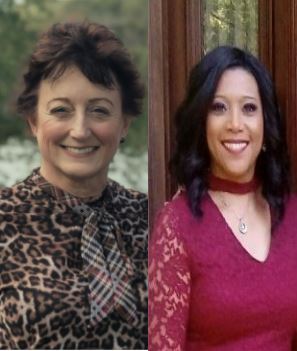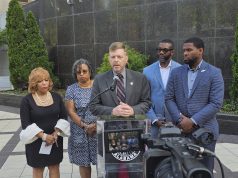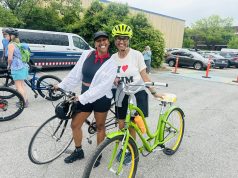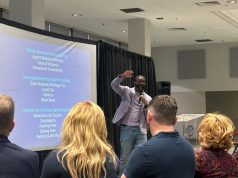Solomon Crenshaw Jr.
For The Birmingham Times
The goal of the All of Us Research Program is to help researchers understand more about why people get sick or stay healthy. People who join give information about their health, habits, and what it’s like where they live. By looking for patterns, researchers may learn more about what affects people’s health.
Marlo Agnew Mccaw and Suzy Cheney are research study navigators. That job entails making sure that various communities are aware of the study, informing communities and potential participants about the components of the study and what it entails so that they can make an informed decision to participate.
Here, Marlo and Suzy discuss the program.
In a few words, could you explain what the All of Us Research Program is?
Agnew Mccaw: The All of Us Research Program is a national research study that aims to enroll a million or more people over time, from all different backgrounds, to help speed up medical breakthroughs. Participants can share their electronic health record, give blood samples, urine samples, and physical measurements, and this information is placed in a large database for researchers to help advance precision medicine.
How did you hear about All of Us?
Cheney: I applied for the job in the UAB department of preventive medicine. They wanted to hire somebody to recruit for All of Us. That’s what I was doing before the pandemic, working at Kirkland Clinic and talking to people about All of Us, explaining what it was, signing them up, and getting them involved. That’s what I did, and so far we’ve got over 300,000 participants (enrolled). We’re well on our way to our goal.
Why are you motivated to propel All of Us forward?
Agnew Mccaw: This is a groundbreaking, historic study. Nothing like this has ever been done before. This program could change people’s lives, the lives of their children, and ultimately the way that we do healthcare.
What does precision medicine and care mean to you?
Cheney: It means getting the right medicine to the right person at the right time. We’re all different. Something that may work for me may not work for you. This program was started actually by a man whose son was born with a congenital abnormality. They didn’t have any medicine for him; he didn’t know what to do. He started a forum on Facebook, started collecting data. He wanted to find other families that were dealing with the same issues. There was another gentleman who had pancreatic cancer, and what they were treating him with wasn’t working. They had his DNA sequenced, and they tried something else – another drug that they use for another type of cancer, and it worked for him. He was young and decided that was his mission. He wanted to get medicine to people that will work because we’re all different.
Where can participants enroll?
Agnew Mccaw: Participants can go to www.JoinAllofUs.org/UAB and enroll with their email address or their phone number. They can also call the UAB support line at (833) JOIN-UAB to enroll.
What made you decide to join the All of Us Research Program team?
Cheney: I was excited about having such a database for researchers to work with that was so diverse. Nothing like this has ever been done before. It appealed to me, the idea that we could help people in ways they’ve never been helped before to get precision medicine – medicine that they would need for their body when needed. They’re already doing vaccine trials and cancer research with this database. And because it’s so diverse, they can look at patterns and DNA. That’s another thing (DNA sequencing) that people can opt in or opt out. People have a choice. You can either decide you want to do it or you don’t. You can participate as much or as little as you want to. But if you do want DNA results, we can give those back to you, which is very interesting. A lot of people want that information.
Why is All of Us a trustworthy program in which to engage?
Agnew Mccaw: All of Us has strict privacy and security safeguards in place to protect your information and your identity. All participant data is encrypted and researchers agree to a code of conduct for responsible data use.
Who would you encourage to enroll in this program and why?
Cheney: Everyone and especially the underrepresented. White males are generally encouraged (to participate in research). They’re recruited, and there’s a lot of research for specific groups. But we really work hard to try to get all minorities, all groups, all types in All of Us. I really would encourage people that aren’t very well represented in other studies to sign up for this because they will be represented. Their DNA and their participation will be counted. I think that’s important because I don’t think some groups have had that kind of representation before. That excites me.
Agnew Mccaw: I would encourage people from all ages and backgrounds to participate in this study, especially those who have been underrepresented in the past. The only way to know that we’re going to have the best treatment for everyone is for people to participate in research.
What would you say to someone who has been hesitant about signing up for the All of Us Research Program?
Cheney: We do have a shameful chapter in our history, concerning Tuskegee and things that should never have happened. But I would say that since then we’ve learned a lot. Our security is so much tighter. As far as our database goes, it is locked down as tight as any database could ever be. They’re constantly testing, trying to (fortify) it and have a whole team working on protecting this data. I know people are hesitant, and I understand that. I sympathize, I really do. If they don’t want to join, that’s fine. They can participate as much as they want to. But I would encourage them that this is a chance to be represented.
When can one enroll?
Agnew Mccaw: Participants can enroll online at any time as long as they’re 19 or older. They won’t be able to give their samples, or do their physical measurements because of COVID, of course, because the clinics are closed. But we will be scheduling appointments once we’re back in clinic for their vital measurements. This could be early 2021.
The program really likes to treat participants as partners and not as patients. Talk about that, please.
Cheney: We call them participants because they are. And we consider them partners because they are. They give us information (and) we give information back. We’re all in this together really and trying to drive healthcare forward, trying to make some medical breakthroughs. We do call them our partners, and we’re very thankful for them. NIH is right now looking for incentives, things that we can do for our partners. We give participants a $25 Visa card when they sign up, once they give their bio samples. But we’re looking for other ways to keep encouraging people to stay with us and to keep answering surveys and check in. I tell people to check in about once a month. There’s always information coming back and it’s good information, and solid. The interesting thing too is you can compare your answers with other people’s answers across the nation (anonymously). You can kind of see where you are in the spectrum (of responses) or how different you are and how similar you are to other people across the nation.





